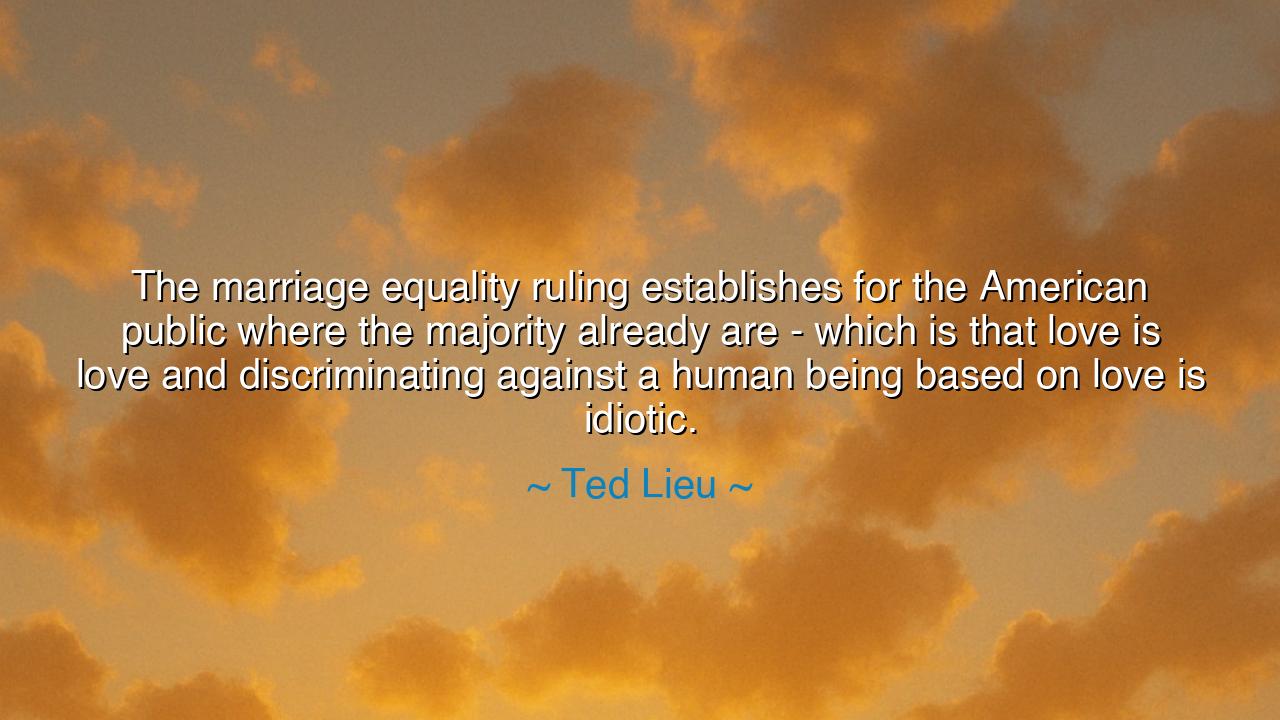
The marriage equality ruling establishes for the American public
The marriage equality ruling establishes for the American public where the majority already are - which is that love is love and discriminating against a human being based on love is idiotic.






Hear now, O Children of the Future, the powerful words of Ted Lieu, who speaks of a monumental shift in the landscape of justice and human dignity: "The marriage equality ruling establishes for the American public where the majority already are - which is that love is love and discriminating against a human being based on love is idiotic." These words carry the weight of truth, humanity, and progress. They call upon us to recognize that the most fundamental and universal force in the world—love—cannot, and should not, be bound by the shackles of prejudice or outdated tradition. Marriage equality, in Lieu’s eyes, is not a matter of politics or debate, but a simple, undeniable truth: when we love, we are human, and we must celebrate that love, regardless of form.
In the ancient world, love was celebrated, but it was often constrained by the norms and expectations of society. Greek mythology is filled with stories of divine love, where gods and mortals alike transcended earthly boundaries to be with the ones they adored. The story of Achilles and Patroclus, whose bond went beyond mere friendship, is one such example. Though their love was not fully understood in the context of the times, their devotion to each other was pure and true. Their love, like all love, defied the boundaries set by society, showing that the heart cannot be caged by convention. Yet, the world of the ancients was often defined by a rigid structure that sought to control relationships and love—love was confined by what society deemed acceptable and appropriate. In this context, Ted Lieu’s words echo the call for freedom—the freedom for love to exist without restriction, free from the judgments of others.
In ancient Rome, the same tension between societal norms and the reality of human love existed. Emperor Hadrian and his lover Antinous lived in a world where their relationship, though passionate and deeply cherished, was still subject to the constraints of public opinion. Though Hadrian’s love for Antinous was legendary, it was never fully embraced by society, as the Roman Empire demanded conformity and obedience to its established norms. The social acceptance of love was limited, and many couples, whether of the same or opposite sex, found their relationships constrained by the dictates of their time. Lieu’s statement, however, marks a decisive turning point in the modern world—the moment when society began to accept that love is love, and no individual should be punished or condemned for the love they choose to share.
The idea of love being love is also seen in the civil rights movements of the 20th century. Dr. Martin Luther King Jr. spoke of the freedom to love as a basic human right, saying, "I have a dream that one day little children will not be judged by the color of their skin but by the content of their character." King’s words, though primarily focused on racial equality, laid the groundwork for the universal equality of all human beings. The fight for racial justice mirrored the fight for marriage equality—both are struggles against the forces of discrimination and ignorance. In both cases, society was called to move beyond the shackles of outdated beliefs and recognize the dignity of all people, regardless of their differences. Ted Lieu’s declaration calls upon the legacy of this wisdom, urging us to embrace love in all its forms, and to dismiss the ignorance that seeks to divide us.
The marriage equality ruling in the United States, which Lieu refers to, was a momentous victory for the LGBTQ+ community and for all who believe in freedom, justice, and equality. Just as the ancient civilizations struggled with reconciling love and societal norms, modern societies, including America, have wrestled with the same issues—what love is acceptable, and who is worthy of the rights that come with it. The decision to recognize same-sex marriage was a recognition that love transcends gender and form, and that all people deserve to marry the person they love without fear of discrimination. It was a victory not just for those who love differently, but for human dignity itself.
The lesson, O Children, is profound: love cannot and should not be confined by the narrow views of society or by the ignorance of others. Love is love, no matter the shape it takes, and it is one of the most beautiful and powerful forces that connects us all as human beings. The fight for marriage equality is not just a political struggle—it is a moral one, one that calls upon us to reject discrimination and embrace equality. Ted Lieu’s words are a call to action for all of us to live in a world where love is celebrated in all its forms, where freedom and justice are not merely ideals but lived realities.
In your own life, let this truth guide you: Celebrate love in all its diversity, for it is the most natural and universal force that connects us all. Stand against discrimination in all its forms, and be a voice for those whose love has been silenced or condemned. Respect the dignity of others, and strive to build a world where love knows no boundaries. Whether it is love between two people, a family, or a community, let love be the foundation upon which we build our world—free from judgment, free from hate, and open to all who seek its warmth. Love is love, and in this truth, we find the greatest lesson: the more we love, the more human we become.






AAdministratorAdministrator
Welcome, honored guests. Please leave a comment, we will respond soon